2020年高考英语全国卷一试卷分析报告专项模拟讲义总复习
2020年高考全国卷英语试卷点评分析
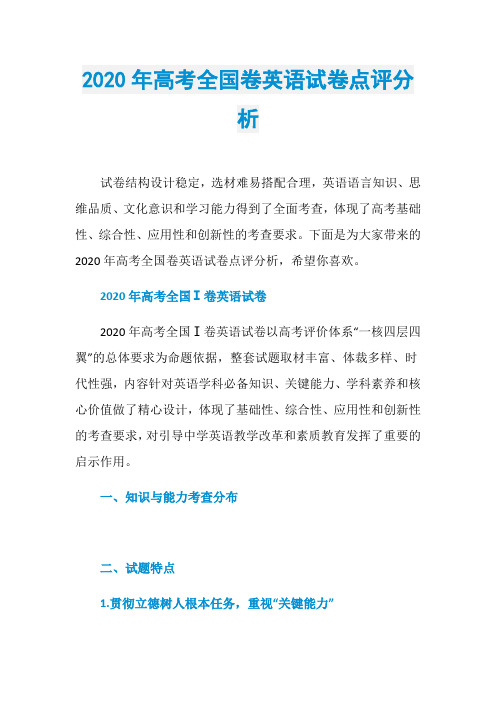
2020年高考全国卷英语试卷点评分析试卷结构设计稳定,选材难易搭配合理,英语语言知识、思维品质、文化意识和学习能力得到了全面考查,体现了高考基础性、综合性、应用性和创新性的考查要求。
下面是为大家带来的2020年高考全国卷英语试卷点评分析,希望你喜欢。
2020年高考全国Ⅰ卷英语试卷2020年高考全国Ⅰ卷英语试卷以高考评价体系“一核四层四翼”的总体要求为命题依据,整套试题取材丰富、体裁多样、时代性强,内容针对英语学科必备知识、关键能力、学科素养和核心价值做了精心设计,体现了基础性、综合性、应用性和创新性的考查要求,对引导中学英语教学改革和素质教育发挥了重要的启示作用。
一、知识与能力考查分布二、试题特点1.贯彻立德树人根本任务,重视“关键能力”从整套试卷的取材来看,突出了对人文关怀、节能意识、健康理念、审美情趣的考查,体现了高考的育人功能和积极导向作用。
如,阅读理解A篇考查实际语言应用场景——火车站相关信息阅读,贴近生活,倡导活学活用;阅读理解B篇介绍重复阅读的好处,对于学生的学习和成长具有指导意义。
七选五阅读语篇选材以“自我接纳”为主题,引导考生积极进行自我对话,关注青少年心理健康,体现了以人为本的价值理念。
完形填空的主题为人与自我,文风偏散文,作者通过讲述亲子关系,对自己的行为进行了反思并有所感悟。
在批判自我中获得对于事物的认知与成长,对于启发与培养学生良好思维品质有积极的引导作用。
短文改错讲述了“我”在妈妈的指导下学做饭的经历,兼具趣味性和知识性,贴合学生实际生活经验,提倡了劳动精神。
2.关注社科进步发展,培养探索创新意识试卷紧扣“人与自我、人与自然、人与社会”三大主题语境,语篇涉及了火车失物招领、阅读之美、体育运动、前沿科技等多个方面,贴近生活实际情景,在语篇基础上深入考查综合语言运用能力。
阅读理解D篇介绍了“植物能源”这一前沿科技,提醒学生关注与生活工作相关的科技动态,引导学生了解科学领域的最新成果,培养创新意识;在语法填空部分,介绍了中国探索太空的最新研究进展,不仅帮助学生拓宽视野,也能激发学生的爱国精神,增强中国自信。
2020年高考全国I卷英语试题特点分析
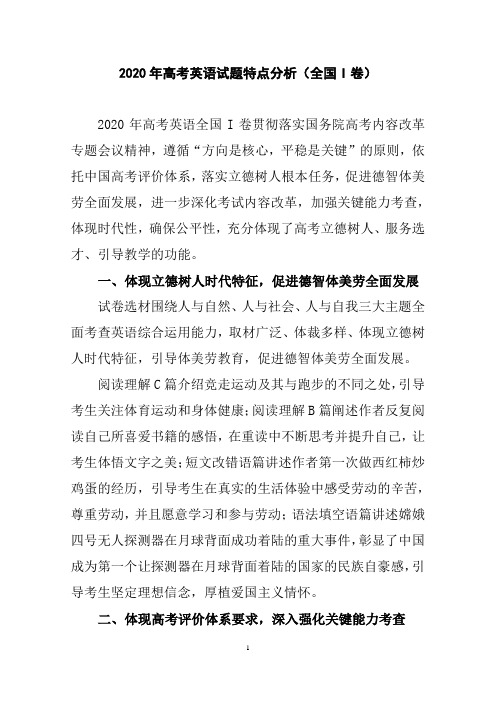
2020年高考英语试题特点分析(全国I卷)
2020年高考英语全国I卷贯彻落实国务院高考内容改革专题会议精神,遵循“方向是核心,平稳是关键”的原则,依托中国高考评价体系,落实立德树人根本任务,促进德智体美劳全面发展,进一步深化考试内容改革,加强关键能力考查,体现时代性,确保公平性,充分体现了高考立德树人、服务选才、引导教学的功能。
一、体现立德树人时代特征,促进德智体美劳全面发展
试卷选材围绕人与自然、人与社会、人与自我三大主题全面考查英语综合运用能力,取材广泛、体裁多样、体现立德树人时代特征,引导体美劳教育,促进德智体美劳全面发展。
阅读理解C篇介绍竞走运动及其与跑步的不同之处,引导考生关注体育运动和身体健康;阅读理解B篇阐述作者反复阅读自己所喜爱书籍的感悟,在重读中不断思考并提升自己,让考生体悟文字之美;短文改错语篇讲述作者第一次做西红柿炒鸡蛋的经历,引导考生在真实的生活体验中感受劳动的辛苦,尊重劳动,并且愿意学习和参与劳动;语法填空语篇讲述嫦娥四号无人探测器在月球背面成功着陆的重大事件,彰显了中国成为第一个让探测器在月球背面着陆的国家的民族自豪感,引导考生坚定理想信念,厚植爱国主义情怀。
二、体现高考评价体系要求,深入强化关键能力考查
1。
2020年全国高考英语一卷试题解析

2020年全国高考英语一卷试题解析第一部分听力(共两节,满分 30 分)听力部分要求考生听懂有关日常生活中所熟悉的话题,如:问路、修理电视机、裁剪衣袖、谈论航班时间、如何改进文章、谈论周末活动、打电话取消会议、购买摄像机、采访著名插画家、陌生人之间的闲谈。
与往常相同,听力部分中有 10 段听力材料,其中的 5 段较短,另 5 段则较长。
话题覆盖面广,对话内容逻辑清楚,话语流畅。
所考查的听力微技能包括:获取事实性具体信息、对所听内容作出简单推断。
问题涉及多个方面,多个角度,采用 where-, why-, how-, who-, what- 等多种特殊疑问句。
录音人:男 Kris Chung;女 Laura Estelles口音:美音词数:864(比 2019 年 I 卷多 37 词)时间:5 分 52 秒语速:147 词/分(比 2019 年 I 卷每分钟快 14 词)难度:难度整体与 2019 年持平考点:2020 年高考英语全国卷听力的 20 个小题中,考查获取事实性具体信息的 11 个题,对所听内容作出推断的 9 个题。
第一节(Text 1)M: Excuse me. How can I get to the nearest supermarket?W: It's on Pennings Road. Go past the post office and it's on your left.(词数:24;时间:9″;语速:160 词/分)本段材料内容为问路。
1. Where does the conversation probably take place?A. In a supermarket.B. In the post office.C. In the street.【分析】考查考生对所听内容作出简单推断的能力。
男士问女士如何到达最近的超市,女士给男士指路,告诉他It's on PenningsRoad. Go past the post office and it's on your left. 由此可推断,对话最可能发生在大街上。
新课标全国卷Ⅰ英语学科试题分析及备考建议市公开课金奖市赛课一等奖课件

得分率
●阅读理解62% ●完形填空57% ●语法填空52% ●短文改错48% ●书面表示40% ●听力30%
第16页
(一)听力
●平均分9.06,难度系数0.30 ●与去年难度持平
第17页
第一节(共5小题;每题1.5分,满分7.5分)
1. What time is it now?
A. 9:10.
B. 9:50.
【考察意图】该题考察获取详细事实性信息。
第35页
19. Who suggests a price for each tea?
A. Tea tasters.
B. Tea exporters.
C. Tea companies.
【答题情况】答案:A
【考察意图】该题考察获取详细事实性信息。
第36页
20. What is the speaker talking about? A. The life of tea tasters. B. Afternoon tea in Britain. C. The London Tea Trade Centre. 【答题情况】答案:C
【考察意图】该题考察主旨要义。
第37页
启示: 考纲要求:1. 理解主旨要义 2. 获取 详细、事实性信息 3. 对所听内容作 出判断 4. 理解说话者意图、观点和态 度。 20个小题,14个获取详细、事实 性信息,4个推理,1个主旨要义,1 个说话者观点。
第38页
(二)阅读理解
●侧重考核对语篇整体理解能力,同时还考察 快速阅读能力、跨文化交际意识和阅读策略等。 ●由5篇短文构成,总词量为1839(其中短文 词量1353,试题词量486,读速52.54WPM)。 ●短文体裁丰富,涉及应用文、记叙文、阐明 文,以阐明文为主。
2020年新高考全国1卷英语精讲精析

2020年新高考全国1卷英语精讲精析全文共6篇示例,供读者参考篇1Hey guys! Did you take the big English test this year? The Gaokao is really important for getting into a good university. Let me tell you all about the English part!The reading section had some pretty cool passages. There was one about a man named Charles Parton who liked making kites and models of flying machines. He was born way back in 1674 in England! Can you imagine living that long ago? The passage said he loved solving problems and was very curious about how things worked. Just like you kids!Another reading was about the Three Tenors - three really famous opera singers who gave amazing concerts together in the 1990s. Their names were Luciano Pavarotti, Placido Domingo, and Jose Carreras. They sang beautiful Italian opera music. Maybe some of you have heard opera before? It's where big voices sing loud with no microphones! The passage talked about how popular and successful their shows were all over the world.Then there was a passage on making pottery and ceramics the traditional Chinese way. It explained the different steps like kneading the clay, shaping it on a pottery wheel, decorating, glazing, and firing in a kiln oven. You would have to be so patient and skilled to make pretty pottery! The passage said China has been famous for its ceramics for thousands of years.For the writing section, there was an opinion piece about whether kids should get an allowance from their parents for doing chores or getting good grades. What do you think? Should you get paid for cleaning your room or scoring an A on a test? You had to state your view and give reasons.Another writing was a letter to a friend inviting them on a camping trip and describing all the fun activities planned like hiking, swimming, roasting marshmallows. Doesn't that sound like an awesome adventure? I would love to go camping and make s'mores!There was also a super interesting writing prompt that asked you to re-tell a famous story or myth but from the perspective of a different character. Like the story of The Three Little Pigs from the wolf's point of view! Or maybe Cinderella from the Evil Stepmother's side? You could get really creative with that one.For listening, you heard a talk about efforts to save endangered animal species. Like tigers, elephants, rhinos, and pandas. Some are hunted for their fur or tusks which is so sad. Other species lose their habitat when forests get cut down. We have to protect these amazing creatures!There was also a conversation about a boy joining a basketball team and what skills the coach thought he needed to work on, like dribbling and shooting baskets. Sports talks are always fun to listen to.All in all, I think this English test had some pretty neat topics that kids your age could relate to - animals, sports, stories, camping, and making things with your hands. It was a good mix of reading, writing, and listening.I hope this gives you a breakdown of what was on the big test. Don't stress too much though, just try your best! Let me know if you have any other questions.篇2The Big Kids' Super Tough English TestHey there, fellow kids! Did you hear about the crazy hard English test that all the big kids had to take last year to get intocollege? It was called the Gaokao, and the English part was no joke! I got my hands on a copy of the test, and let me tell you, it was like trying to read a whole book in another language. But don't worry, your pal here is gonna break it down for you in a way that even we little munchkins can understand.First up, the listening part. Can you imagine having to listen to all these different conversations and speeches in English without any pictures to help you? Insane, right? They had dialogues about things like renting an apartment, workplace conflicts, and even crazy stuff like gene editing. Who talks about that kind of stuff anyway? I could barely follow the plots of the kids' movies I watch, let alone all this grown-up nonsense.But the reading part, oh boy, that's where the real fun began! They had passages about everything from the history of the English language to the benefits of doing yoga. There was even an excerpt from a novel that was so deep and philosophical, I got lost just trying to pronounce all the big words. And you know what the worst part was? There were no colorful illustrations or anything to make it more interesting. Just page after page of tiny little letters that all looked the same to me.Now, let's talk about the writing section. The big kids had to write an entire essay about whether or not they agreed withsome quote from a famous person. Are you kidding me? I can barely write a few sentences about what I did over summer vacation without getting bored and doodling all over my paper. And the crazy part is, they were expected to use all these fancy words and proper grammar and everything. No slang or text speak allowed, which is basically the only way I know how to communicate these days.But wait, there's more! There was also a section on grammar and vocabulary where they had to choose the right word or phrase to fill in the blanks. Talk about a snooze fest! I mean, who actually cares about stuff like that anymore? Isn't that what spell check and autocorrect are for?All in all, this Gaokao English exam was a real doozy. It's no wonder all the big kids looked so stressed out andsleep-deprived leading up to it. Just thinking about having to sit through all of that makes me want to take a nap.So, to all my fellow little dudes and dudettes out there, cherish these carefree days while you can. Because once you hit high school and start prepping for the Gaokao, things are gonna get real serious, real fast. But hey, at least you'll have my awesome breakdown to help you make sense of it all when the time comes!In the meantime, I'm gonna go play some video games and forget all about this crazy English exam madness. Peace out, party people!篇3Hi kids! Today we're going to talk about the big English exam that high school students took in 2020. It was a really important test that helped decide which colleges they could go to. Let's dive in and see what it was all about!The first section was listening comprehension. The students had to listen to different recordings and answer questions about what they heard. There were conversations between people, news reports, lectures, and more. Listening is super important because we need to understand spoken English, not just reading and writing it.One conversation was between two friends deciding what movie to watch. They had to pick the right details like the movie name, genre, and show times. Another recording was about a teenager interviewing for her first job. The questions checked if you caught important details like her skills, schedule availability, and the job responsibilities.There were also longer recordings like a professor lecturing about the history of smartphones. You had to identify the main ideas and supporting details from the lecture. Tricky stuff! But listening carefully and taking good notes is the key.The next section was reading comprehension - one of my favorites! There were different passages to read about topics like science, culture, and social issues. The questions asked you to identify the main ideas, analyze the author's perspective and writing style, make inferences about things not directly stated, and more.One passage was about the evolution of language and how it changes over time. The questions checked if you understood vocabulary in context, could summarize the key points, and grasp the overall argument.Another passage described a innovative new type of renewable energy source. You had to recognize facts and opinions, evaluate the evidence provided, and critically analyze the potential pros and cons discussed.To do well on this section, you need strong reading skills like skimming for the main idea, scanning for details, identifying transition words that connect ideas, and being able to read between the lines.The third section focused on writing skills and required an essay response. One prompt asked you to discuss the impacts of artificial intelligence on society in the future. Do you think AI will be a big helper for humans or a potential threat that needs to be carefully controlled?For this kind of question, you need to present a clear argument or perspective, support it with logical reasoning and relevant examples or evidence, organize your ideas coherently with good paragraph structure, and use precise vocabulary and correct grammar.Another writing prompt gave two differing viewpoints on banning plastic bags and asked you to analyze both sides before stating your own position. This requires evaluating multiple perspectives objectively, finding the merits and potential flaws in each argument, and synthesizing your thoughts into awell-reasoned independent response.The last section of the exam covered language usage and required identifying errors in grammar, vocabulary, spelling, sentence structures, and more. You had to pick the incorrect portion of a sentence and provide the proper correction.For example, one question was "John and me went to the park yesterday." Can you spot the mistake there? Me should be the object pronoun I since it is the subject of the verb went.Another example was "He could easily ran five miles." Do you see the verb tense error? It should be "He could easily run five miles" since could implies the ability, not the act itself.There were also questions testing your knowledge of idiomatic expressions, proper word order, parallel structure, subject-verb agreement and other grammar rules. Paying close attention to details is crucial!Phew, that's a lot to cover! The exam really tested your overall English ability across listening, reading, writing, vocabulary, and grammar. The best way to prepare is to regularly practice all those skills through reading books, watching shows, writing journals, having conversations, and of course, doing lots of practice tests!I hope this kid-friendly explanation gave you a good overview of what was on that big important English exam. Just remember to study hard, but also get enough rest, eat healthy foods to keep your brain sharp, and don't stress too much. You got this! Let me know if you have any other questions.篇4The Big Test: An Epic Tale of the 2020 English ExamHey there, kids! Are you ready for an exciting story about a really important test? I'm talking about the 2020 National English Test Paper 1 – the big kahuna of all English exams! Buckle up and get your pencils ready because we're about to dive into the depths of this epic adventure.First things first, let's talk about the listening section. It was like a game of "Who can hear the best?" You had to listen really carefully to those recordings and answer questions about what you heard. Some of the questions were easy-peasy, but others were trickier than a fox in a henhouse!One of the passages was about a girl named Sarah and her amazing adventure in the jungle. Can you imagine being surrounded by tall trees, colorful birds, and maybe even a few friendly monkeys? Sarah had to be super brave to explore that wild place! The questions asked you to remember important details about her trip, like what she saw and how she felt. It was like you were right there with her, swinging from vines and splashing in the river.But that's not all! There were also conversations between people talking about their daily lives. You had to listen carefully to figure out what they were discussing and answer questions about it. It was like playing a big game of "I Spy" with your ears!Next up was the reading section, where you got to flex your super reading powers! There were all kinds of passages to read, from stories about brave explorers to articles about interesting topics like animals or technology. Some of the questions asked you to find specific information in the passages, while others wanted you to understand the main idea or the writer's purpose.One passage that really stood out was about a boy named Jack who loved to build things. He was like a tiny engineer, always tinkering and creating cool gadgets. The questions asked you to figure out what kind of person Jack was and why he enjoyed building so much. It was like stepping into his workshop and watching him work his magic!But the reading section wasn't just about stories – there were also some tricky vocabulary questions thrown in there. You had to use your word-smarts to figure out the meanings of different words based on how they were used in the passages. It was like a game of "Guess That Word" with some really big, fancy-pants words!Last but not least, we had the writing section. This was your chance to let your imagination run wild and create your own stories or essays. One of the prompts asked you to write about a special place you've visited, like a cool park or a fun museum. You could describe all the amazing things you saw and did there, making the reader feel like they were right there with you!Another prompt wanted you to write about someone you admire, like a family member, teacher, or even a famous person. You could tell the world why this person is so awesome and what makes them special. It was like giving them a big, heartfelt hug with your words!Overall, the 2020 National English Test Paper 1 was a real adventure! It challenged your listening skills, reading comprehension, vocabulary knowledge, and writing abilities. But if you studied hard and believed in yourself, you were sure to conquer this epic exam like a true English hero!So, there you have it, kids – the inside scoop on the big test from yours truly. Now go out there, sharpen those pencils, and show the world what you're made of!篇5The Big Test for Going to University in 2020Hi everyone! Did you take a really important test last year to try and get into a good university? I'm talking about the gaokao - that huge exam that students in China have to take after finishing high school. Well, the English part of that test in 2020 was pretty interesting, so I wanted to tell you all about it!First off, the listening part asked you to listen to recordings and answer questions. There were some conversations between people talking about things like travel plans, grocery shopping, and homework assignments. Listening carefully is super important for this section. The speakers didn't always talk slowly and clearly like your teachers do!Then there were some longer recordings you had to listen to, like a lecture about the history of fireworks and another one about the migration patterns of certain animals. Those can be hard because you have to pay close attention for a long time to understand all the details. My advice is to listen for the main ideas first, and then go back and catch the specifics.The reading part was probably the hardest section for a lot of students. You had to read fairly long passages on topics like marine biology, urban planning, and new technologies. The passages used some really advanced vocabulary and spoke about complex ideas. When I have to read difficult texts likethose, I make sure to read the questions first so I know what to look for. I also make notes about the main points as I'm reading to help me locate the important information quickly.As for the writing tasks, one asked you to write a narrative essay by looking at some picture prompts. It's fun to make up stories, but you have to be sure to organize your ideas logically and describe things vividly. Another writing task involved reading a comment someone made and then stating your own opinion on the issue they brought up. When you write these opinion pieces, it's good to give clear reasons for your viewpoint using specific examples.Overall, the 2020 gaokao English section required skills like careful reading and listening, logical thinking, clear writing, and strong vocabulary knowledge. It was definitely challenging, but studying hard and doing lots of practice tests can really prepare you well.I know taking a huge test like the gaokao can be scary, but just remember to stay calm, manage your time wisely, and don't get discouraged. If you put in your best effort, that's already a big accomplishment! Tests are opportunities to show off what you've learned, not something to be afraid of.Whew, that was a lot to cover! I really admire all the high school students who worked so hard to take on that English exam last year. Keep up the great efforts, and I'm wishing you all the best no matter what exam comes your way. Let me know if you have any other questions!篇6The 2020 Gaokao English Exam: A Kid's PerspectiveHey there, kids! Did you know that every year, high school students in China have to take a really important test called the Gaokao? It's like the biggest exam ever, and it decides which college they can go to. Crazy, right?This year, in 2020, the English part of the Gaokao was super tough, or at least that's what my older brother said. He's in high school, and he had to take it. He studied so hard for months and months, and he was really nervous on the day of the exam. I remember him leaving the house early in the morning with his backpack and a water bottle, looking like he was about to go to war or something!Anyway, when he came back home after the English exam, he looked exhausted. He said the reading comprehension passages were really long and difficult, with lots of big wordsthat he didn't even know. And the grammar questions were tricky, too! He said there were some grammar rules that he had never seen before, and he had to guess a lot of the answers.But you know what? My brother is really smart, and he studied so hard, so I'm sure he did just fine. He's always been good at English, especially listening and speaking. He used to practice with me all the time, and he would make me repeat words and phrases over and over again until I got them right. Sometimes it was really annoying, but now I'm glad he did that because my English is pretty good, too!After the exam, my brother told me that the listening part was the easiest for him. He said the recordings were clear, and the questions were straightforward. He also said that the writing task wasn't too bad because he had practiced a lot of essay writing in his English classes.Overall, my brother said the 2020 Gaokao English exam was challenging, but he felt prepared because his teachers had trained him really well. He said the exam tested his English skills in all areas, like reading, writing, listening, and grammar, which is exactly what the Gaokao is supposed to do.I'm not sure how my brother did on the exam yet, but I'm keeping my fingers crossed for him. He worked so hard, and hereally wants to get into a good university. I hope he gets the score he needs to make his dream come true!Anyway, that's the scoop on the 2020 Gaokao English exam from a kid's perspective. If you're a high school student in China, I'm sure you know all about it already. But for the rest of us kids, it's just another big, scary test that our older siblings have to go through.Good luck to all the students who took the Gaokao this year! And remember, even if you didn't do as well as you hoped, there's always next year. Just keep studying hard, and you'll get there eventually.That's it from me, kids! Now go outside and play or something. All this talk about exams is making me tired!。
2020年高考英语全国一卷(精校+精析)

绝密★启用前2020年普通高等学校招生全国统一考试(全国卷I)英语注意事项:1. 答卷前,考生务必将自己的姓名、准考证号填写在答题卡和试卷指定位置上。
2. 回答选择题时,选出每小题答案后,用铅笔把答题卡上对应题目的答案标号涂黑。
如需改动,用橡皮擦干净后,再选涂其他答案标号。
回答非选择题时,将答案写在答题卡上,写在本试卷上无效。
3. 考试结束后,将本试卷和答题卡一并交回。
第一部分听力(共两节,满分30分)做题时,先将答案标在试卷上。
录音内容结束后,你将有两分钟的时间将试卷上的答案转涂到答题卡上。
第一节(共5小题;每小题1.5分,满分7.5分)听下面5段对话。
每段对话后有一个小题,从题中所给的A、B、C三个选项中选出最佳选项。
听完每段对话后,你都有10秒钟的时间来回答有关小题和阅读下一小题。
每段对话仅读一遍。
例:How much is the shirt?A. £19.15.B. £9.18.C. £9.15.答案是C。
1. Where are the speakers?A. At a swimming pool.B. In a clothing shop.C. At a school lab.2. What will Tom do next?A. Turn down the music.B. Postpone the show.C. Stop practicing.3. What is the woman busy doing?A. Working on a paper.B. Tidying up the office.C. Organizing a party.4. When will Henry start his vacation?A. This weekend.B. Next week.C. At the end of August.5. What does Donna offer to do for Bill?A. Book a flight for him.B. Drive him to the airport.C. Help him park the car.第二节(共15小题;每小题1.5分,满分22.5分)听下面5段对话或独白。
2020年高考全国卷Ⅰ英语高考试题深度解析(全翻译含答案)
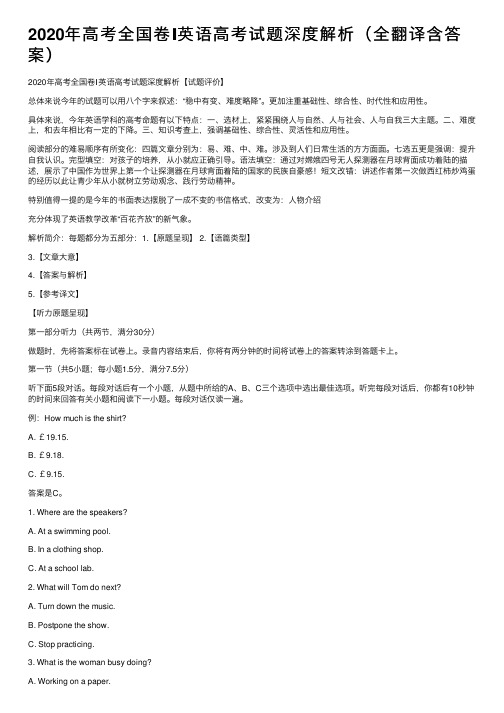
2020年⾼考全国卷Ⅰ英语⾼考试题深度解析(全翻译含答案)2020年⾼考全国卷Ⅰ英语⾼考试题深度解析【试题评价】总体来说今年的试题可以⽤⼋个字来叙述:“稳中有变、难度略降”。
更加注重基础性、综合性、时代性和应⽤性。
具体来说,今年英语学科的⾼考命题有以下特点:⼀、选材上,紧紧围绕⼈与⾃然、⼈与社会、⼈与⾃我三⼤主题。
⼆、难度上,和去年相⽐有⼀定的下降。
三、知识考查上,强调基础性、综合性、灵活性和应⽤性。
阅读部分的难易顺序有所变化:四篇⽂章分别为:易、难、中、难。
涉及到⼈们⽇常⽣活的⽅⽅⾯⾯。
七选五更是强调:提升⾃我认识。
完型填空:对孩⼦的培养,从⼩就应正确引导。
语法填空:通过对嫦娥四号⽆⼈探测器在⽉球背⾯成功着陆的描述,展⽰了中国作为世界上第⼀个让探测器在⽉球背⾯着陆的国家的民族⾃豪感!短⽂改错:讲述作者第⼀次做西红柿炒鸡蛋的经历以此让青少年从⼩就树⽴劳动观念、践⾏劳动精神。
特别值得⼀提的是今年的书⾯表达摆脱了⼀成不变的书信格式,改变为:⼈物介绍充分体现了英语教学改⾰“百花齐放”的新⽓象。
解析简介:每题都分为五部分:1.【原题呈现】 2.【语篇类型】3.【⽂章⼤意】4.【答案与解析】5.【参考译⽂】【听⼒原题呈现】第⼀部分听⼒(共两节,满分30分)做题时,先将答案标在试卷上。
录⾳内容结束后,你将有两分钟的时间将试卷上的答案转涂到答题卡上。
第⼀节(共5⼩题;每⼩题1.5分,满分7.5分)听下⾯5段对话。
每段对话后有⼀个⼩题,从题中所给的A、B、C三个选项中选出最佳选项。
听完每段对话后,你都有10秒钟的时间来回答有关⼩题和阅读下⼀⼩题。
每段对话仅读⼀遍。
例:How much is the shirt?A. £19.15.B. £9.18.C. £9.15.答案是C。
1. Where are the speakers?A. At a swimming pool.B. In a clothing shop.C. At a school lab.2. What will Tom do next?A. Turn down the music.B. Postpone the show.C. Stop practicing.3. What is the woman busy doing?A. Working on a paper.B. Tidying up the office.C. Organizing a party.4. When will Henry start his vacation?A. This weekend.B. Next week.C.At the end of August.5. What does Donna offer to do for Bill?A. Book a flight for him.B. Drive him to the airport.C. Help him park the car.第⼆节(共15⼩题;每⼩题1.5分,满分22.5分)听下⾯5段对话或独⽩。
2020高考英语全国卷1解析
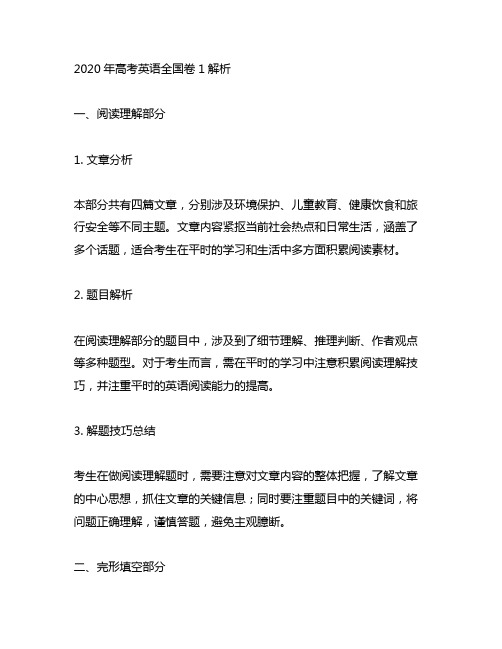
2020年高考英语全国卷1解析一、阅读理解部分1. 文章分析本部分共有四篇文章,分别涉及环境保护、儿童教育、健康饮食和旅行安全等不同主题。
文章内容紧抠当前社会热点和日常生活,涵盖了多个话题,适合考生在平时的学习和生活中多方面积累阅读素材。
2. 题目解析在阅读理解部分的题目中,涉及到了细节理解、推理判断、作者观点等多种题型。
对于考生而言,需在平时的学习中注意积累阅读理解技巧,并注重平时的英语阅读能力的提高。
3. 解题技巧总结考生在做阅读理解题时,需要注意对文章内容的整体把握,了解文章的中心思想,抓住文章的关键信息;同时要注重题目中的关键词,将问题正确理解,谨慎答题,避免主观臆断。
二、完形填空部分1. 文章分析本部分的文章为一篇记叙文,通过一次家庭旅行的经历,展现了家人之间的温馨与关怀。
文章情节紧凑,故事情节生动有趣,能够引起考生的共鸣。
2. 题目解析完形填空部分的题目主要考察考生的词汇理解能力、语法搭配能力以及篇章结构的把握能力。
考生在做这部分题目时,需要通盘考虑上下文的语境,正确理解句子的逻辑关系。
3. 解题技巧总结做完形填空题时,考生应该先通读考试文章,了解全文的大意,然后再依据文章的语境和情节,逐句理解,逐步填写空格。
在填写时要注意上下文的逻辑关系,尤其是对一些常见短语和固定搭配的理解和掌握。
三、阅读表达和短文改错部分1. 阅读表达部分阅读表达主要考察考生对文章中细节的准确把握,以及对文章主旨的理解能力。
考生在平时需要多读一些文章,并进行精读和泛读,以提高自己的阅读理解水平。
2. 短文改错部分短文改错部分主要考察考生对语言规范的掌握能力和对语法知识的应用能力。
考生在平时的学习中,需要注重对英语语法知识的系统学习和掌握,提高自己的语言表达能力。
四、书面表达部分1. 文章分析书面表达部分的题目通常包括命题作文和情景作文两种形式。
命题作文要求考生根据所给的题目要求进行写作,情景作文要求考生通过所给的情景进行表达。
2020年高考全国Ⅰ卷英语课件专项模拟讲义总复习
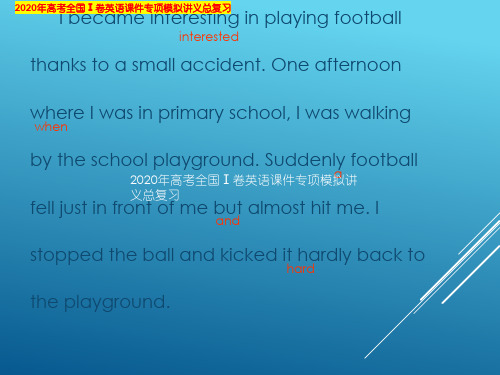
42. A. stories B. buildings
C. crowds D. reporters
43. A. position B. age C. face D. name
B
Hearing these stories, I'm 44A about the place — other destinations are described as “purer” natural experiences.
than they actually are. Of 69 nineteen recognized polar
bear subpopulations, three are declining, six 70 (be) stable, one is increasing, and ninealareck enough data.
D
Every yCear about 40,000 people attempt to climb Kilimanjaro, the highest mountain in Africa. They 41 with them lots of waste. The 42 might damage the beauty of thCe place. The glaciers (冰川)are disappearing, changing the 43 of Kilimanjaro.
58. A. Obviously
B. Easily
C. Consequently D. Finally
59. A. permanent B. little C. fresh D. artificial
2020全国卷I英语试题讲解

书面表达(满分25分)
• 你校正在组织英语作文比赛。请以身边值 得尊敬和爱戴的人为题,写一篇短文参赛, 内容包括:
1. 人物简介; 2. 尊敬和爱戴的原因。 注意:
1. 词数100左右; 2. 短文题目和首句已为你写好。
The person I respect
We have a lot of respectable people around us. They may be our teachers, parents or one of our elders. As for me, my father is the person I respect most. My father is a teacher who loves his work and his students very much. He works very hard every day but he will also spare some time to accompany me and share many funny things with me about his work.
Text 7
8. Why does David want to speak to Mike? A. To invite him to a party. B. To discuss a schedule. C. To call off a meeting. 9. What do we know about the speakers? A. They are colleagues. B. They are close friends. C. They’ve never met before.
Today I tried cooking a simply dish myself. I like eating frying tomatoes with eggs, and I thought it must to be easy to cook. My mom told me how to preparing it. First I cut the tomatoes into pieces but put them aside. Next I broke the eggs into a bowl and beat them quickly with chopstick. After that I poured oil into a pan and turned off the stove. I waited patiently unless the oil was hot. Then I put the tomatoes and the beaten eggs into pan together. “Not that way,” my mom tried to stop us but failed. She was right. It didn’t tum out as I had wished.
2020年高考英语全国Ⅰ卷考点分析与2021年备考建议(9页)

2020年高考英语全国Ⅰ卷考点分析与2021年备考建议2020年高考(全国Ⅰ卷)英语试卷结构:第一部分:听力(30分)第二部分:阅读理解(40分)第三部分:语言知识运用(40分)第一节完形填空(30分)第二节语法填空(10分)第四部分:写作(35分)第一节短文改错(10分)考点:①形容词、副词②介词③非谓语动词④动词不定式⑤连词⑥名词单复数⑦固定短语搭配⑧连词⑨冠词⑩代词第二节:书面表达(25分)题目:你校正在组织英语作文比赛。
请以身边值得尊敬和爱戴的人为题,写一篇短文参赛。
备考建议:听力:①重视常规话题,平时要多听多练;②可以听一些英文歌曲、看一些英语电影来培养自己的听力;③注重交流,多和同学用英语进行交流。
阅读理解:①平时在训练时就要注重认真、仔细,严谨,在选择时一定要在原文之中找出依据。
②积累错题,重视总结。
将自己每次做错的题目记录下来。
分析错误原因,看看自己是哪个方面出来问题,及时查漏补缺。
③平时要多与老师一起交流、沟通,共同寻找问题,这样有助于自己快速提高。
完形填空:①平时要注重词汇的积累,遇到不会的词要及时查阅词典,勤于做笔记,并且及时复习。
②完形填空一定要把他看成一个整体,注重文章的内在逻辑。
找到对应点再作选。
③一定要重视纠错,每次练习把自己做错的题目记录下来,总结错因,并且及时复习,这样坚持下去,一定能够有所进步。
语法填空和短文改错:这两块内容建议同学们可以每天抽一定的时间有针对性的训练一下,比如代词这一块不太好,我就多找一些关于代词的练习,从句掌握的不太好,就多找一些关于从句的练习题。
然后就是坚持纠错总结。
坚持下去,一定能够有所突破。
书面表达:①平时要多看一些经典范文,将范文中的好句子摘录下来,在平时的训练中加以运用。
并且定期地进行复习这些句子。
②最好能够养成写英语心得的习惯,将自己每天的感受用英语写下来,并且请老师或同学帮你修改一下。
这样有助于提高自己的英语能力。
③要重视纠错,每次训练或考试老师一般都会指出自己作文中的错误。
2020年新高考一卷英语试题分析解析
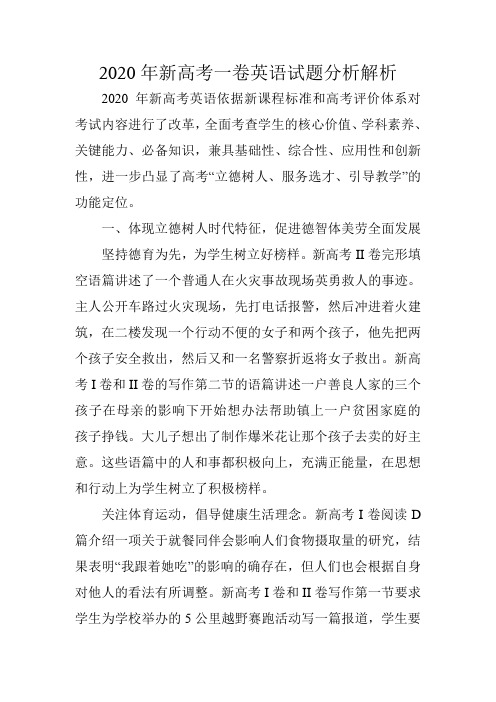
2020年新高考一卷英语试题分析解析2020年新高考英语依据新课程标准和高考评价体系对考试内容进行了改革,全面考查学生的核心价值、学科素养、关键能力、必备知识,兼具基础性、综合性、应用性和创新性,进一步凸显了高考“立德树人、服务选才、引导教学”的功能定位。
一、体现立德树人时代特征,促进德智体美劳全面发展坚持德育为先,为学生树立好榜样。
新高考II卷完形填空语篇讲述了一个普通人在火灾事故现场英勇救人的事迹。
主人公开车路过火灾现场,先打电话报警,然后冲进着火建筑,在二楼发现一个行动不便的女子和两个孩子,他先把两个孩子安全救出,然后又和一名警察折返将女子救出。
新高考I卷和II卷的写作第二节的语篇讲述一户善良人家的三个孩子在母亲的影响下开始想办法帮助镇上一户贫困家庭的孩子挣钱。
大儿子想出了制作爆米花让那个孩子去卖的好主意。
这些语篇中的人和事都积极向上,充满正能量,在思想和行动上为学生树立了积极榜样。
关注体育运动,倡导健康生活理念。
新高考I卷阅读D 篇介绍一项关于就餐同伴会影响人们食物摄取量的研究,结果表明“我跟着她吃”的影响的确存在,但人们也会根据自身对他人的看法有所调整。
新高考I卷和II卷写作第一节要求学生为学校举办的5公里越野赛跑活动写一篇报道,学生要紧扣主题,展开想象,从参加人员、跑步路线、活动反响等方面进行写作,使每一个要点都得到明确的体现。
这样的语篇和任务情境贴近学生的生活实际,有利于引导学生注意健康饮食,开展体育运动。
宣传劳动光荣,引导学生热爱劳动。
新高考I卷阅读B 篇讲述一个从小在农场长大的女孩高中毕业后一边工作一边读完技校,还供家中弟妹完成学业,成家后又重返校园攻读学位,不仅为自己的孩子树立了榜样,也成为家族的荣耀。
新高考全国I卷完形填空语篇讲述一个来自海岛农村的男孩几十年如一日在所住村庄周边的荒岛上植树造林,最后把荒岛变成了多种动植物的生态家园。
这些语篇和情境引导学生在真实的生活体验中感受劳动的辛苦和荣耀,引导学生崇尚劳动,尊重劳动,认同劳动。
2020年高考(全国Ⅰ卷)英语考点分析与2021年备考建议

2020年高考(全国Ⅰ卷)英语考点分析与2021年备考建议2020年高考(全国Ⅰ卷)英语试卷结构:第一部分:听力(30分)第二部分:阅读理解(40分)第三部分:语言知识运用(40分)第一节完形填空(30分)第二节语法填空(10分)第四部分:写作(35分)第一节短文改错(10分)考点:①形容词、副词②介词③非谓语动词④动词不定式⑤连词⑥名词单复数⑦固定短语搭配⑧连词⑨冠词⑩代词第二节:书面表达(25分)题目:你校正在组织英语作文比赛。
请以身边值得尊敬和爱戴的人为题,写一篇短文参赛。
备考建议:听力:①重视常规话题,平时要多听多练;②可以听一些英文歌曲、看一些英语电影来培养自己的听力;③注重交流,多和同学用英语进行交流。
阅读理解:①平时在训练时就要注重认真、仔细,严谨,在选择时一定要在原文之中找出依据。
②积累错题,重视总结。
将自己每次做错的题目记录下来。
分析错误原因,看看自己是哪个方面出来问题,及时查漏补缺。
③平时要多与老师一起交流、沟通,共同寻找问题,这样有助于自己快速提高。
完形填空:①平时要注重词汇的积累,遇到不会的词要及时查阅词典,勤于做笔记,并且及时复习。
②完形填空一定要把他看成一个整体,注重文章的内在逻辑。
找到对应点再作选。
③一定要重视纠错,每次练习把自己做错的题目记录下来,总结错因,并且及时复习,这样坚持下去,一定能够有所进步。
语法填空和短文改错:这两块内容建议同学们可以每天抽一定的时间有针对性的训练一下,比如代词这一块不太好,我就多找一些关于代词的练习,从句掌握的不太好,就多找一些关于从句的练习题。
然后就是坚持纠错总结。
坚持下去,一定能够有所突破。
书面表达:①平时要多看一些经典范文,将范文中的好句子摘录下来,在平时的训练中加以运用。
并且定期地进行复习这些句子。
②最好能够养成写英语心得的习惯,将自己每天的感受用英语写下来,并且请老师或同学帮你修改一下。
这样有助于提高自己的英语能力。
③要重视纠错,每次训练或考试老师一般都会指出自己作文中的错误。
2020年高考全国卷英语试卷点评分析

2020年高考全国卷英语试卷点评分析试卷结构设计稳定,选材难易搭配合理,英语语言知识、思维品质、文化意识和学习能力得到了全面考查,体现了高考基础性、综合性、应用性和创新性的考查要求。
下面是为大家带来的2020年高考全国卷英语试卷点评分析,希望你喜欢。
2020年高考全国Ⅰ卷英语试卷2020年高考全国Ⅰ卷英语试卷以高考评价体系“一核四层四翼”的总体要求为命题依据,整套试题取材丰富、体裁多样、时代性强,内容针对英语学科必备知识、关键能力、学科素养和核心价值做了精心设计,体现了基础性、综合性、应用性和创新性的考查要求,对引导中学英语教学改革和素质教育发挥了重要的启示作用。
一、知识与能力考查分布二、试题特点1.贯彻立德树人根本任务,重视“关键能力”从整套试卷的取材来看,突出了对人文关怀、节能意识、健康理念、审美情趣的考查,体现了高考的育人功能和积极导向作用。
如,阅读理解A篇考查实际语言应用场景——火车站相关信息阅读,贴近生活,倡导活学活用;阅读理解B篇介绍重复阅读的好处,对于学生的学习和成长具有指导意义。
七选五阅读语篇选材以“自我接纳”为主题,引导考生积极进行自我对话,关注青少年心理健康,体现了以人为本的价值理念。
完形填空的主题为人与自我,文风偏散文,作者通过讲述亲子关系,对自己的行为进行了反思并有所感悟。
在批判自我中获得对于事物的认知与成长,对于启发与培养学生良好思维品质有积极的引导作用。
短文改错讲述了“我”在妈妈的指导下学做饭的经历,兼具趣味性和知识性,贴合学生实际生活经验,提倡了劳动精神。
2.关注社科进步发展,培养探索创新意识试卷紧扣“人与自我、人与自然、人与社会”三大主题语境,语篇涉及了火车失物招领、阅读之美、体育运动、前沿科技等多个方面,贴近生活实际情景,在语篇基础上深入考查综合语言运用能力。
阅读理解D篇介绍了“植物能源”这一前沿科技,提醒学生关注与生活工作相关的科技动态,引导学生了解科学领域的最新成果,培养创新意识;在语法填空部分,介绍了中国探索太空的最新研究进展,不仅帮助学生拓宽视野,也能激发学生的爱国精神,增强中国自信。
2020年高考英语试题评析报告

2020年高考英语试题评析报告2020年高考英语试题评析报告2020年高考英语试题的命题方向是贯彻国务院高考内容改革专题会议的精神,以中国高考评价体系为基础,落实立德树人的根本任务,促进德智体美劳的全面发展。
此次考试进一步深化了考试内容改革,加强了关键能力的考查,体现了时代性,确保了公平性,充分发挥了高考立德树人、服务选才、引导教学的功能。
1.体现立德树人时代特征,促进德智体美劳全面发展2020年高考英语全国卷试题选材围绕人与自然、人与社会、人与自我三大主题,全面考查英语综合运用能力,体现了立德树人时代特征,引导了体美劳教育,促进了德智体美劳的全面发展。
首先,试题融入了中国元素,切实增强了“四个自信”。
例如,全国I卷语法填空语篇讲述了嫦娥四号无人探测器在月球背面成功着陆的重大事件,彰显了民族自豪感;全国II卷语法填空语篇讲述了中国部分地区在春节期间用竹子、桔树和梅花装饰家居的传统风俗惯;全国III卷语法填空语篇以秀美漓江为背景,讲述了中国历史上一段有关人与自然和谐入画的故事。
这些语篇向学生展示了我国社会主义建设的新成就和中华优秀传统文化,引导学生坚定理想信念和爱国主义情怀,切实增强“四个自信”。
其次,试题关注了体育运动,倡导了健康运动理念。
例如,全国I卷阅读C篇介绍了竞走运动及其与跑步的不同之处;全国II卷短文改错语篇讲述了欢迎外国友人到中国研究武术,期待一起练;全国III卷短文改错语篇讲述了母亲关注家人健康,为家人制作健康饮食。
这些语篇通过设置真实的语言情境,引导学生关注体育运动,提高锻炼意识,重视健康饮食。
第三,试题渗透了美育知识,引导审美情趣养成。
例如,全国I卷阅读B篇阐述了作者反复阅读自己所喜爱书籍的感悟,在重读中不断思考并提升自己;全国II卷阅读A篇介绍了英国某湖区的文化类旅游景点;全国II卷完形填空语篇讲述了主人公购得名家油画真迹的故事;全国III卷语法填空语篇讲述了一位中国古代画家找寻最伟大的艺术大师“自然母亲”的故事。
2020年 高考英语分析及历年对比专项模拟讲义总复习

形容词 2题 2题 3题 2题 2题
副词 0题 1题 0题 3题 1题
2019选词填空难度适中
1. 分值微调,10选9调整为11选10。难度较往年有所下降。 去年第一次考到三个副词且不易填,难度较大。今年动词虽 多,但是没有考到非谓语,基本都是动词原形,且重搭配,如: commit oneself to,relieve the burden of, classify… as…其中 一个动词三单signals在文章中更容易定位。
70. Which of the following best fits in the box with a “?” in THE HABIT LOOP?
A. Pick a new cue. B. Form a new habit. C. Choose a new reward. D. Design a new resolution.
A. The Harry Potter poster. B. Reading 30 pages of an English novel. C. An English newspaper. D. Watching TV for half an hour.
C篇相比A,B篇难度有所增加,讲一个科技装置, 可以虚拟现实让两个人互相转换。文章取材来看 依旧是科技文,这样的选材增加了难度。但是它 设置的题目比较容易找出答案。
目的/地点状 语从句
/
主语从句
/
表语从句
1题
名词性从句
(2题)
宾语从句
1题
同位语从句
0题
定语从句 (1题)
1题
2016
1题 / /
1题 / /
1题 1题 1题
2017
2020年普通高校招生考试全国I卷英语试题精析(6页)
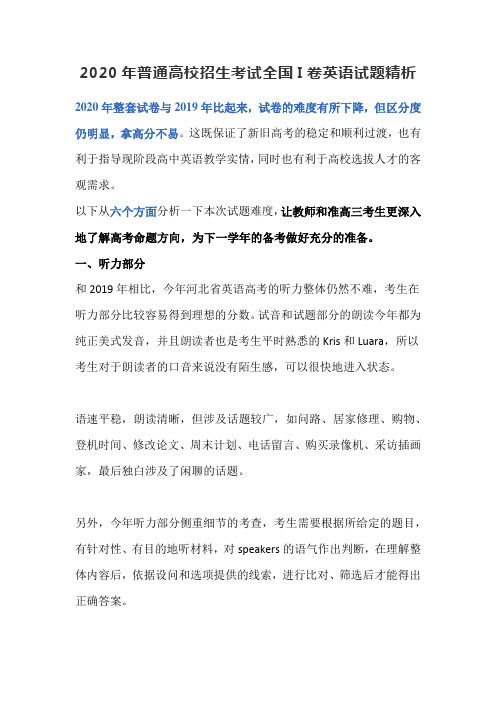
2020年普通高校招生考试全国I卷英语试题精析2020年整套试卷与2019年比起来,试卷的难度有所下降,但区分度仍明显,拿高分不易。
这既保证了新旧高考的稳定和顺利过渡,也有利于指导现阶段高中英语教学实情,同时也有利于高校选拔人才的客观需求。
以下从六个方面分析一下本次试题难度,让教师和准高三考生更深入地了解高考命题方向,为下一学年的备考做好充分的准备。
一、听力部分和2019年相比,今年河北省英语高考的听力整体仍然不难,考生在听力部分比较容易得到理想的分数。
试音和试题部分的朗读今年都为纯正美式发音,并且朗读者也是考生平时熟悉的Kris和Luara,所以考生对于朗读者的口音来说没有陌生感,可以很快地进入状态。
语速平稳,朗读清晰,但涉及话题较广,如问路、居家修理、购物、登机时间、修改论文、周末计划、电话留言、购买录像机、采访插画家,最后独白涉及了闲聊的话题。
另外,今年听力部分侧重细节的考查,考生需要根据所给定的题目,有针对性、有目的地听材料,对speakers的语气作出判断,在理解整体内容后,依据设问和选项提供的线索,进行比对、筛选后才能得出正确答案。
此外,独白部分的话题为small talk,此话题在2018年高考英语全国II卷D篇阅读理解中出现过,如果考生在备考过程中,曾经做过该篇阅读,话题就不会陌生,试题比较容易选出答案。
当然,听力也并不是没有挑战,比如:在text 9中,采访著名插画家, 明显感觉话题内容丰富新颖,材料篇幅较长(229词),涉及多个话题之间的转换,部分考生容易抓不住核心而失分。
二、阅读理解与2019年相比,今年阅读理解材料仍然新颖,但没有涉及新冠肺炎疫情的热点材料,总体感觉阅读材料偏易并且题目设置不难。
应用文A篇,讲述火车购票信息,较易。
考生只要读懂题目并根据题干所问的关键信息,在读懂表格信息的基础上,在文中准确定位,很容易找到正确答案。
然而,按照新高考的命题思路,今后这样几乎属于送分的题目越来越少了。
2020年全国高考英语试卷分析
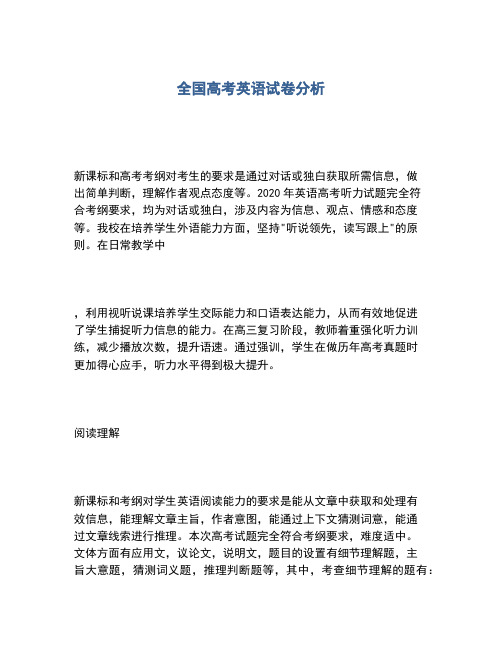
全国高考英语试卷分析新课标和高考考纲对考生的要求是通过对话或独白获取所需信息,做出简单判断,理解作者观点态度等。
2020年英语高考听力试题完全符合考纲要求,均为对话或独白,涉及内容为信息、观点、情感和态度等。
我校在培养学生外语能力方面,坚持"听说领先,读写跟上"的原则。
在日常教学中,利用视听说课培养学生交际能力和口语表达能力,从而有效地促进了学生捕捉听力信息的能力。
在高三复习阶段,教师着重强化听力训练,减少播放次数,提升语速。
通过强训,学生在做历年高考真题时更加得心应手,听力水平得到极大提升。
阅读理解新课标和考纲对学生英语阅读能力的要求是能从文章中获取和处理有效信息,能理解文章主旨,作者意图,能通过上下文猜测词意,能通过文章线索进行推理。
本次高考试题完全符合考纲要求,难度适中。
文体方面有应用文,议论文,说明文,题目的设置有细节理解题,主旨大意题,猜测词义题,推理判断题等,其中,考查细节理解的题有:第21、22、23、24、25、30、32、33题,考查主旨大意的题有:第28、35题,考查推测词义的题是第26题,考查推理判断的题有:第27、29、31、34题,可以说,阅读理解充分考查了学生的英语阅读能力。
我校通过典范英语、21世纪英文报等原汁原味的阅读材料来扩大学生的阅读量,坚持整进整出的教学方式,通过课前自主预习、课堂讨论表演、课后续写改写来提升学生的综合阅读能力。
在处理文本时,注重挖掘文本背后的文化内涵,培养学生的跨文化意识,通过讨论、辩论等环节来培养学生的思辨能力。
完形填空完形填空体裁为记叙文,讲述了作者在一次巧合中救了自己亲生儿子的故事,传递了帮助别人就是帮助自己的正确的价值取向,体现了新课标中要求培养学生正确的世界观、人生观、价值观的理念,具有积极的教育意义。
试题考查了学生通过阅读语篇,整体把握故事脉胳,分析语言信息之间的逻辑关系,从而选出最恰当选项的能力。
这种考察方式与我校坚持的"整进整出"的教学理念和典范英语教材教学方式不谋而合。
- 1、下载文档前请自行甄别文档内容的完整性,平台不提供额外的编辑、内容补充、找答案等附加服务。
- 2、"仅部分预览"的文档,不可在线预览部分如存在完整性等问题,可反馈申请退款(可完整预览的文档不适用该条件!)。
- 3、如文档侵犯您的权益,请联系客服反馈,我们会尽快为您处理(人工客服工作时间:9:00-18:30)。
• 【第四部分:写作】
• 第一节:短文改错延续8:1:1的改错原则,8 个改词,1个多词,1个缺词。考察重点和 方式与往年区别不大。
• 第二节:书面表达整体中等难度,以邮件 的形式介绍去中国朋友家做客的一些习俗。 是传统的书信形式,难度不大。
体裁:应 用文—— 约稿信 (书信)
话题:邀 请美国朋 友彼得为 校报写一 篇介绍美 国节日风 俗和中学 生生活的 短文。
体裁:应 用文—— 咨询信 (书信)
话题:针 对一所英 国学校发 布的一篇 广告进行 关于计划 暑期去英 国学习的 具体信息 咨询。
四、2019备考指南
1.语法知识的梳理要更加全面,侧重学生对语 法知识的基本理解和灵活应用。语法知识 的学习不能孤立起来,要跟各个题型的应 用相结合。以定语从句为例,要掌握定语 从句的基本知识点,明确在短文改错、语 法填空中的考查方式;掌握阅读理解中定 语从句相关的长难句分析;掌握写作中定 语从句句式的灵活应用,以提高写作层次。 这样语法知识的学习才能更加全面,真正 理解,达到语法知识学习的根本目的。
七 选 五
段首设 段首设 段首设 段首设 段首设 空1个 空2个 空1个 空2个 空2个
段中设 段中设 段中设 段中设 段中设 空3个 空2个 空4个 空3个 空3个
段尾设 段尾设 段尾设 段尾设 段尾设
空1个 空1个 空0个 空0个 空0个
体裁:
记叙文 体裁:
完 形 填 空
体 夹 议 动 ( 9名 个 形 和 4个 个裁 叙 类 词 短 词 容 副7: 夹 语 词 词)体 夹 议 动 ( 1名 个 形 和 40个个裁叙类词短词容副6:夹语词词)动(8名个形和3介(2个个个词短词容副词短语词词语4 ))夹议动(6名个形和6定个个叙类词短词容副语夹 语 词 词 从7 )体 议 动 ( 4名 个 形 和 7个 个裁 论 词 短 词 容 副9: 文 语 词 词)
each,last等词修饰时,其前不用介词。故删除for。 • 10. but改成and 考查并列连词的用法。
• 三、2015-2019年新课标高考英语高考点分 布及对比分析
题型
2019年
2018年
2017年
2016年
2015年
阅 读 理 解
A篇:说
A篇:应用 A篇:应用 明文
文—游客指 文—游客指 B篇:新
体裁:记 叙文
【有提示 词】
动词时态 和语态1个 非谓语动 词2个 词性转换2 个
代词1个 名词1个 【无提示 词】
介词1个 冠词1个 定语从句1 个
体裁:记 叙文
【有提示 词】
动词时态 和语态2个 非谓语动 词2个 词性转换1 个 名词1个 代词1个 【无提示 词】 介词1个 形容词和 副词1个 定语从句1
2.词汇的学习是英语成绩提升的根本,所以要 重视词汇的学习和积累。高中单词很多, 要分层次的学习。重点单词要会读,会写 而且掌握基本的用法及词性转换。非重点 单词在阅读理解里面出现不影响理解就可 以。掌握各个题型如听力、阅读、完形中 的高频词汇,能提高单词学习的效率。
• 3.各个题型都有一定的做题方法,但最根本 的还是词汇和语法知识的灵活应用,所以 题型做题方法与技巧的讲解不能脱离具体 题目的练习,否则学生不会掌握到任何实 质性的方法和技巧。
体裁: 记叙文
考点: 连词、 时态、 形容词 副词、 动词的 语态、 动词短 语、冠 词、代 词
体裁: 记考时冠连介、词名情词叙 点 态 词 词 词 副 词 态 、形文 : 、 、 、 容 词 、 动 代、体 记 考 介 名 时 冠 、 词 连形裁 叙 点 词 词 态 词 副 词、 容: 文 : 、 、 词、 词
• The best exercise is one that you enjoy and will do. But otherwise… it's probably running. To avoid knee pain, you can run on soft surfaces, do exercises to ___68___(strength) your leg muscles(肌肉), avoid hills and get good running shoes. Running is cheap, easy and it's always ___69___(energy). If you are time poor, you need run for only half the time to get the same benefits as other sports, so perhaps we should all give____70____a try.
连词3 句1个
个
语 法 填 空
பைடு நூலகம்
体裁:议 论文
【有提示 词】
动词时态 和语态1个 非谓语动 词2个 形容词和 副词1个 名词1个 词性转换2 个
【无提示 词】 介词1个 定语从句1 个
体裁:说 明文
【有提示 词】
动词时态 和语态2个 非谓语动 词2个 形容词和 副词2个 名词1个 【无提示 词】 介词1个 冠词1个 定语从句1 个
A篇:应 用文—广 告
B篇:记 叙文
C篇:说 明文
D篇:记 叙文
细节理解 题12个 推理判断 题2个 词义猜测 题1个 标题概括
A篇:应 用文—布 告
B篇:说 明文
C篇:议 论文
D篇:说 明文
细节理解 题8个 推理判断 题5个 词义猜测 题2个 标题概括
体裁: 体裁: 体裁: 体裁: 体裁:
说明文 记叙文 说明文 议论文 说明文
南
南
闻报道
B篇:记叙文 B篇:记叙文 C篇:记
C篇:说明文 C篇:记叙文 叙文
D篇:说明文 D篇:说明文 D篇:说
细节理解题9 细节理解题9 明文
个
个
细节理解
推理判断题3 推理判断题3 题9个
个
个
推理判断
词义猜测题1 词义猜测题2 题4个
个
个
词义猜测
标题概括题2 标题概括题1 题1个
个
个
标题概括
题1个
• While running regularly can't make you live forever, the review says it ___64___ (be) more effective at lengthening life ___65___ walking, cycling or swimming. Two of the authors of the review also made a study published in 2015 ___66___ showed a mere five to 10 minutes a day of running reduced the risk of heart disease and early deaths from all ___67___(cause).
• 【答案】61. longer • 62. to see 63. dying • 64. is 65. than • 66. that \which • 67. causes 68. strengthen • 69. energetic • 70. it \running
• During my last winter holiday, I went to countryside with my father to visit my grandparents. I find a change there. The first time I went there, they were living in a small house with dogs, ducks, and another animals. Last winter when I went here again, they had a big separate house to raise dozens of chicken. They also had a small pond, which they raised fish. My grandpa said last summer they earned quite a lot by sell the fish. I felt happily that their life had improved. At the end of our trip, I told my father that I planned to return for every two years, but he agreed.
• According to a review of evidence in a medical journal, runners live three years ___61___(long) than non-runners. You don't have to run fast or for long___62___(see)the benefit. You may drink, smoke, be overweight and still reduce your risk of ___63___ (die) early by running.
• 1. countryside前加the 考查冠词 2. find改成found 考 查动词时态。
• 3. another改成other 考查形容词的用法。他们住在 一个小房子里,院子里有狗、鸭子和其他牲畜。 another表示“总数为三个以上中任意的另一个”, other表示“别的”,“另外的”,只能与复数名词连用。 根据后面的animals可知,将another改成other。
